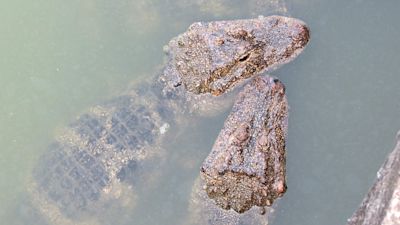Why researchers got an alligator to inhale helium

Listen to a recording of the alligator bellowing (Credit: Improbable Research)
A team of scientists snapped up an international prize on Thursday for a study that involved getting an alligator to inhale helium.
The group, led by Dr Stephan Reber, gave an oxygen-helium mix to the reptile in order to analyse the different sound frequencies of its bellows.
This was a serious piece of scientific research, but its comedic aspect drew the attention of science humour magazine Annals of Improbable Research.
The publication's Ig awards are a spoof of the renowned Nobel science prize. Improbable Research says the annual ceremony honours "achievements that make people laugh, then think".
Dr Reber and his colleagues had attempted to prove that crocodilians and other reptiles could communicate their body size through vocalisations, as mammals and birds do.
The team won the Ig Nobel's acoustics prize - just one of the awards up for grabs on Thursday. Other winners this year include researchers who found a way to identify narcissists by studying their eyebrows and scientists who tried to make knives from frozen faeces.
The annual ceremony is 30 years old and usually takes place at Harvard University in Massachusetts. The awards are normally physically handed out by genuine Nobel Laureates, but because of the pandemic, the 2020 ceremony took place online.
The winning teams were awarded a 10 trillion dollar bill from Zimbabwe. It's a long-running joke - The Southern African country scrapped its native currency over a decade ago because of hyperinflation.
2020's Ig Nobel Prize winners
Acoustics - Stephan Reber, Takeshi Nishimura, Judith Janisch, Mark Robertson, and Tecumseh Fitch, "for inducing a female Chinese alligator to bellow in an airtight chamber filled with helium-enriched air".
Psychology - Miranda Giacomin and Nicholas Rule, "for devising a method to identify narcissists by examining their eyebrows".
Peace - The governments of India and Pakistan, "for having their diplomats surreptitiously ring each other’s doorbells in the middle of the night, and then run away before anyone had a chance to answer the door".
Physics - Ivan Maksymov and Andriy Pototsky, "for determining, experimentally, what happens to the shape of a living earthworm when one vibrates the earthworm at high frequency".
Economics -Christopher Watkins, Juan David Leongómez, Jeanne Bovet, Agnieszka Żelaźniewicz, Max Korbmacher, Marco Antônio Corrêa Varella, Ana Maria Fernandez, Danielle Wagstaff, and Samuela Bolgan, "for trying to quantify the relationship between different countries’ national income inequality and the average amount of mouth-to-mouth kissing".
Management - Xi Guang-An, Mo Tian-Xiang, Yang Kang-Sheng, Yang Guang-Sheng, and Ling Xian Si, five professional hitmen in Guangxi, China, who subcontracted a murder to one another. In the end, none of them carried out the crime.
Entomology - Richard Vetter, "for collecting evidence that many entomologists (scientists who study insects) are afraid of spiders, which are not insects".
Medicine - Nienke Vulink, Damiaan Denys, and Arnoud van Loon, "for diagnosing a long-unrecognized medical condition: Misophonia, the distress at hearing other people make chewing sounds".
Medical Education - Jair Bolsonaro of Brazil, Boris Johnson of the United Kingdom, Narendra Modi of India, Andrés Manuel López Obrador of Mexico, Alexander Lukashenko of Belarus, Donald Trump of the USA, Recep Tayyip Erdogan of Turkey, Vladimir Putin of Russia, and Gurbanguly Berdimuhamedow of Turkmenistan, "for using the Covid-19 viral pandemic to teach the world that politicians can have a more immediate effect on life and death than scientists and doctors can".
Materials Science - Metin Eren, Michelle Bebber, James Norris, Alyssa Perrone, Ashley Rutkoski, Michael Wilson, and Mary Ann Raghanti, "for showing that knives manufactured from frozen human feces do not work well".